Cathy Russell, U.S. ambassador-at-large for global women’s issues, delivered a lecture titled “Why Empowering Women and Girls is Good for U.S. Foreign Policy” Tuesday in the Joukowsky Forum of the Watson Institute for International and Public Affairs. The lecture discussed the importance of incorporating issues of gender equality in international policies to promote the participation of women in world economies and peacemaking processes.
The talk, held as a part of the Watson Distinguished Speaker Series and co-sponsored by the Pembroke Center for Teaching and Research on Women, was moderated by Pamela Reeves, a senior fellow at the Watson Institute and advisor to the Office of Melinda Gates on global women’s issues.
Russell began the talk by explaining the importance of her work. “Women and girls are entitled to equal and full rights,” she said. “Understanding and prioritizing women will make our communities more successful. When women do better, countries do better,” she added.
Russell emphasized the role that the United States plays in setting a moral example as a leader on women’s issues. According to Russell, the United States has made progress in addressing and reducing gender-based violence and offers support and expertise to other countries attempting to address these problems “with a lot of humility,” she said. Russell explained that though the United States has not solved all problems of gender equality, it has a lot of experience working to resolve these issues.
Russell outlined the areas on which she focuses most, including advancing the status of women and girls by addressing gender-based violence and promoting full participation of women in society, particularly within the economic and political realms.
In addition, she spoke to the prevalence of gender-based violence throughout the world by providing statistics that were met with gasps from audience members. “One in three women worldwide face(s) gender-based violence at some point in (her life), while 90 percent of countries have laws that discriminate against women.”
In response to an audience question regarding the invasiveness of a public and international attempt to fight gender-based violence and equality, Russell said that “women are entitled to be free from violence as a fundamental and non-negotiable right.” The issue of women being free from violence is not a matter of different values or a private family matter, she added.
Russell discussed the importance of women participating in peace and security efforts, particularly in light of research proving that countries benefit when women are involved in the economy and stability measures.
Russell referenced a McKinsey Global Institute report stating that the global gross domestic product would rise if men and women had equal roles in the economy, with the GDP in the United States, Japan and Egypt rising by 5, 9 and 34 percent, respectively. A United Nations analysis of 40 peace processes that included women found a 35 percent increase in the probability of the peace agreement lasting 15 years relative to those without women, she added.
Russell mentioned that she initially lacked exposure to and awareness of women’s issues, particularly as she worked in the U.S. Senate and the Department of Justice, where she focused on policy and legal issues. But following her involvement with Women for Women International — a nonprofit humanitarian organization dedicated to financial, educational and interpersonal support of women — she found that there were specific ways to improve the condition of women in certain parts of the world.
“I traveled to Rwanda and Bosnia and saw so many terrible situations in so many parts of the world and found that there were ways that we could successfully try to make things better for them,” Russell told The Herald. “I was intrigued by that, and I felt like the things that I had learned could be used in a way that I had never thought before to help women.”
Russell invoked her favorite quote from Martin Luther King Jr., “The arc of the moral universe is long, but it bends toward justice,” to explain that “every person has the ability to bend that arc a little bit.”
“The key for students is to be aware of the challenges and issues out there that are calling out for their involvement,” Russell told The Herald. “They need to look for what grabs them, what they care about — whether that be education, violence or economic issues. There are ways that people can help organizations do this work, and there are unlimited opportunities of what they can do. The point is that everybody has a role to play.”





